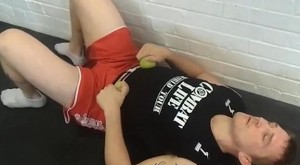As soon as most people are done in the gym, they shoot off, you should probably take time to kick off recovery properly.
Often post training activity is little more than a protein shake, a conversation with training partners or coaches while sitting about. If you are an athlete who trains until late in the evening, you get home and find that you are agitated, heart rate is up and you have trouble getting to sleep. The neural response to training is well known having a big excitatory effect occurring in response to a stress. We call this the flight or fight response and it is dictated by the sympathetic nervous system. This is reason you have trouble coming down from training.
What can we do about it? I Like to use two exercises as part of post training recovery deep breathing and wall shakes. Deep voluntary belly breathing has been shown to shift the nervous system from sympathetic dominance to parasympathetic dominance. Often post training I will have an athlete alternate between two exercises the wall shake and deep belly breaths. We do this for 1-2 minutes taking four seconds to inhale and six seconds to exhale. I cue the athlete to take their fingers and place them about 6 inches either side of their belly button, we same times use tennis balls to the same effect.
So what is a wall shake, basically sidle up to a wall and flatten out your back. Gently roll the legs in and out to near end range in each direction. The wall shake opens up the hips and act as a mechanical flushing method to help speed up recovery.
Below is wallshakes and deepbreathing in action. In Jason’s (below) and a few other fighters cases I prefer to take the distance wider to give a passive stretch on the adductors and hamstrings. Jasons hips are super tight so he struggles to get near to end range.
Often we will combine this foam rolling or hip traction. I feel taking 5 to 10 minutes at the end of session to include something as simple as belly breathing and wall shakes can have a profound effect on future training sessions and if not well it might make it easier to fall asleep that night.
This is an ongoing series of articles from guest blogger and Strength & Conditioning coach William Wayland of Powering Through Facebook
